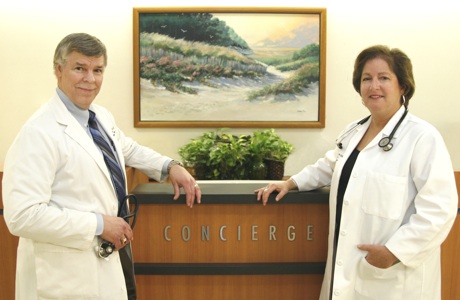

The Virginia Beach Premier Medical NewsletterMay 1, 2011
VBPM Connection is a newsletter published by Virginia Beach Premier Medical, an internal medicine concierge practice dedicated to personalized, highly attentive, high quality care for our patients. The newsletter provides information of a general nature about our office, current health news and various common illnesses and ailments. None of the information provided is meant to be specific for any particular individual. Always seek the advice of your personal physician for any specific information about your health.
Advance Directives
An advance directive is a legal document that helps your family members and your doctors know how you want your medical affairs handled in case you are incapacitated and unable to tell them at the time when they need this information the most. You may say, I’m too young to worry about this, but in fact none of us at any age knows when serious events may occur that would render us incapable of making our own decisions.
Often, this document will be considered and written at the time when you are work on your will and testament. If not, you will have to draw it up separately.
Each state has its own version of the advance directive that they like to use. You can download the standard one that is used in your state usually from the government’s web site. It can be personalized with your own options and wishes. Or you can obtain a copy from your lawyer or have your lawyer draw one up for you according to your specifications. Usually the advance directive will specify a particular person or persons that you want to be the main medical decision-maker/s in the event that you can’t make them yourself. It may also say whether or not you wish to be placed on life support and/or for how long, or whether you want to be kept alive on tube feedings to maintain nutrition. One thing that advance directives often do not address is whether you wish to be resuscitated with CPR, and/or whether to use an artificial ventilator in the event of a cardiac or respiratory arrest. These are two things that are important to decide on ahead of time, so that families are not left wondering what to do or trying to guess what you would have wanted. Don’t hesitate to discuss this with your doctor if you have any questions.
GERD
Gastro-Esophageal Reflux Disease is a very common condition in middle-aged and older adults caused by laxity of the lower esophageal sphincter muscles that usually prevent the acid from the stomach from refluxing up into the esophagus (swallowing tube). This often leads to symptoms of heartburn, frequent coughing, indigestion or even chest pain. It frequently occurs when lying down at night but it can occur during the day as well.
Avoiding eating before lying down, and staying away from spicy foods, caffeine, smoking and alcohol can help. OTC remedies include Zantac, Pepcid and Prilosec. If these don’t help, you should consult your doctor. Sun Damage
 The summer will be upon us again soon, and along with it comes the fun, the beach, the barbecues, the picnics and, of course, sun damage to the skin.
The summer will be upon us again soon, and along with it comes the fun, the beach, the barbecues, the picnics and, of course, sun damage to the skin.
This is especially true for fair-skinned people but it can occur in those with darker skin as well. Too much sun exposure increases risk for all kinds of skin damage including actinic keratoses, which are small scaly lesions that won’t go away and can eventually turn into cancers. Then there are basal cell cancers that can spread locally and cause disfigurement. Squamous cell cancers are a little more dangerous and can potential metastasize (spread to distant areas through the blood stream) though not commonly. Melanoma is the most dangerous skin cancer by far because it has a high risk for metastasizing if not caught early. Make sure you protect your skin with sunscreen of SP15 or higher, wear hats large enough to protect your face, and try to avoid sunburn if at all possible. If you see a suspicious skin sore, show your doctor.
Smoking and Breast Cancer
Adding to the list of serious problems caused by cigarette smoking, recent studies reveal evidence showing active smoking in women increases the risk of breast cancer by 16%. Even passive smoking (living or working in a smoke-filled environment) increases the risk by 9%.
Other things that increase risk of breast cancer include: 1. Starting menses early 8-10% of breast cancer is familial (runs in families). The average American woman runs a lifetime risk of developing breast cancer of 1 out of 9. Still the most common cause of death in women is not breast cancer. It is cardiovascular disease. Did You Know...?
Your blood pressure is regulated by salt and fluid balance, your nervous system, receptors in your carotid arteries, and by chemicals produced by your kidneys and adrenal glands?
Most patients with high blood pressure require two or more medications for adequate blood pressure control? Normal blood pressure is now defined by the Joint National Committee on High Blood Pressure as anything less than 120/80? Chronic use of ibuprofen, Aleve and other anti-inflammatory drugs can cause kidney failure? 90% of kidney stones pass through by themselves? Vaginal yeast infections can be treated with a single dose of fluconazole?
Diverticulosis vs. Diverticulitis
 These two terms are often interchanged and their definitions are unclear.
These two terms are often interchanged and their definitions are unclear. DiverticulOSIS is the condition of having little outpouchings or sacs on the wall of the colon. They are very common occurring in about 50% of those over 50 years old and increasing as time goes on. Most of them occur in the left side of the colon and in the sigmoid area just above the rectum, but they can occur anywhere in the colon. They usually don’t cause any symptoms. DiverticulITIS is the presence of infection within one or more of those diverticular sacs. It usually starts with fever and pain in the left lower abdomen. Sometimes there is a change in bowel habits but not always. It can become a rather serious problem in some cases complicated by perforation of the colon with abscesses and peritonitis. It is discovered by history and examination and/or CT scan of the abdomen. Treatment with Cipro and Flagyl are often effective antibiotics. Sometimes surgery is required. Headaches
Headaches are among the most common causes of visits to the doctor or to the Emergency Room. The most common one is the tension headache, usually described as pressure on both sides or as a tight band around the head. These headaches can occur daily but are not serious and can usually be treated by decreasing the underlying stress or by simple pain remedies. The migraine is the second most common headache, comes on over a period of minutes to hours and can be quite severe. The classic version is one-sided, associated with nausea and vomiting and often start with visual changes. Attacks may be triggered by certain foods or lack of eating regularly. They can sometimes be associated with weakness or numbness that resolve after the headache goes away. They can last anywhere from a few hours to a few days. Cluster headaches are less common. They occur in clusters separated by months or years. Of course certain types of headaches can be associated with various abnormalities of the brain. You should always check with your doctor if you are unsure of the cause. Edema
Edema refers to soft tissue swelling and often results in alarm when first noted – primarily because it sometimes is caused by serious underlying conditions like congestive heart failure, kidney failure, blood clots or liver disease.
Many times, however, the cause is more benign. Medication side effects can be a frequent cause of swelling – often with drugs in the class of calcium blockers – like Norvasc or Procardia.
Another common cause is venous insufficiency caused by bad veins in the legs that cause fluid to seep outside the veins into the soft tissues. The swelling often gets worse and the feet can turn red or even blue when sitting with the legs down for long periods of time. The problem is relieved by using support stockings or keeping the legs elevated as much as possible. About Our Office
Virginia Beach Premier Medical is a membership “concierge” internal medicine practice specializing in comprehensive and compassionate, individualized and personalized patient-centered care. We pride ourselves on full continuity of care – in the office, in the hospital, or even at home.
If you would like more information about our practice please call us at 757-416-6750 or visit our website at www.vbpm1.com. Ask to speak with Brittany, our office manager, or Dr. Parks or Dr. Warth. We’d be happy to talk with you anytime.
Discount Referral Program
Here’s an incentive!
If you are a member of our practice and if you refer someone to us who then signs up, we will give you $200 off your next year’s fee.
Here’s another plus! You can accumulate these referral discounts so that if you refer multiple people who then sign up, you will get $200 off the next year’s fee for each one. Happy Spring!
|



